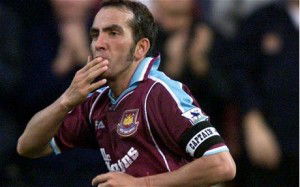 West Ham’s involvement in the Intertoto Cup meant that they would have their shortest close-season in history. Only 62 days had passed since the last game of the previous season before West Ham took to the field against Jokerit of Finland. West Ham had already played four games before the Premier League season began, and this match-fitness head-start on the rest of the division would see them in third place after five games.
West Ham’s involvement in the Intertoto Cup meant that they would have their shortest close-season in history. Only 62 days had passed since the last game of the previous season before West Ham took to the field against Jokerit of Finland. West Ham had already played four games before the Premier League season began, and this match-fitness head-start on the rest of the division would see them in third place after five games.
Although they lost in the first leg of the Intertoto Cup Final 1–0 at home to Metz, West Ham managed to win the return leg 3–1 two weeks later and ensure UEFA Cup football.
Harry Redknapp regarded this result as his greatest night as West Ham’s manager: “That was a great performance and a great day for West Ham, to win the Intertoto Cup and to be in the UEFA Cup and turning in such an outstanding performance against a good French team, to go over there and play so well and win 3–1. We took great support over to France and they enjoyed their day. Yeah, I think that was special. That was a real good day for me and West Ham’s history.”
Frank Lampard was West Ham’s top European goalscorer with four in ten games. He was ever-present in West Ham’s European campaign, along with Trevor Sinclair, Paolo Di Canio and captain Steve Lomas. After making only one substitute appearance in West Ham’s first Intertoto Cup game, Ian Wright was loaned to Nottingham Forest. Later in the season he signed a permanent deal at Celtic.
On 15 December 1999, West Ham played a League Cup quarter-final game against Aston Villa. The game went to extra time and a reserve player, Emmanuel Omoyinmi, was brought on as a substitute for Paulo Wanchope in the 113th minute. Unknown to Redknapp, Omoyinmi had previously played in the competition for Gillingham, where he had spent time on loan earlier in the season, and was thus ineligible to play. Although the Hammers won the game on penalties, the game was replayed after the Football League upheld a complaint by Villa. West Ham lost the replay 3–1. The error eventually led to the resignations of the club secretary Graham Mackrell and the football secretary Alison Dowd: “Whatever happens, I’m responsible for administration here at West Ham United. The buck does stop with me,” said Mackrell.
26 March 2000 saw West Ham meet Wimbledon. The Hammers had only beaten the Dons at home twice in the previous ten meetings between the clubs. The 9th minute of the game saw Di Canio score what would become the BBC’s “Goal of the Season” with an airborne volley. Frédéric Kanouté doubled West Ham’s lead in the 59th minute, before Wimbledon pulled one back after 75 minutes with a 25-yard volley from former Hammer Michael Hughes.
West Ham’s heaviest defeat of the season came on 1 April when they were demolished by table-toppers and eventual champions Manchester United. Wanchope opened the scoring in the 11th minute but Manchester United proceeded to score seven, including a Paul Scholes hat-trick.
This sparked West Ham into a run of three straight wins, culminating with their biggest win of the season on 22 April, when they beat Coventry City 5–0. Di Canio scored in the 48th and 67th minutes, with the other goals coming from Michael Carrick, Javier Margas and Kanouté.
The Boleyn Ground saw its largest attendance of the season (26,044) on the last day against Leeds United. The game ended 0–0, and West Ham finished 9th in the Premier League, putting them in the top nine for the third consecutive season. Redknapp said after the Leeds game: “It’s been a good season again. People don’t realise that West Ham have only finished in the top ten 14 times in its entire history and this is only the second time that we’ve done it three years running.”
Di Canio was the season’s leading scorer with 17 goals in all competitions. Sinclair made the most appearances with 49 in all competitions.
About Sean Whetstone